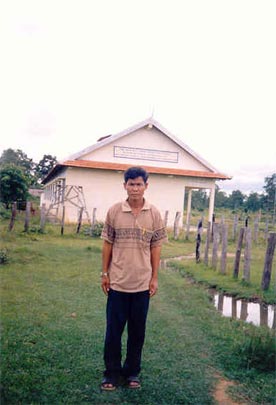The Cambodia Rural School Project
The Siem Bok Nippon
Foundation School

School director Souy Orng near the school building
Souy Orng is the director of the Siem Bok Nippon Foundation School since 1992. In his interview with the JRfC he expressed the joy and gratitude toward the donor as well as some general concern about education in the Siem Bok village. He also described to us his own teaching experience through Cambodia’s dark age.
| On the new building: | I am very happy and grateful to the donor for developing our community through building a school. I believe that the new school building not only improved the village’s educational infrastructure but also organized the community and made people more aware of education. Through helping to build the school, the villagers developed the idea that this school is ours and that it’s our responsibility to keep it clean. Because it turned out to be so beautiful, children from a village 15 kilometers away now come to study, even though they have to stay in this village away from home, and student enrollment has now more than doubled from 80 students to 164 since the school opened. It is also nice to observe that children now dress more decently than before. I think this is because they would otherwise feel intimidated to study in such a beautiful building, or because they are now exposed to an increased number of children from different villages.
Furthermore, with the establishment of the school, more parents have come to understand the importance of education. Most people in the village are farmers and parents need their children to work so it was often difficult for a family to send children to school. But now, not only children, but also parents, are interested in this school. People here believe international aid is good for the village, and feel they need to take good care of what they receive from international donors. The change in attitude was also partly the result of the efforts of various NGOs and international organizations, who occasionally come and explain to the villagers that a Khmer who cannot read Khmer is like a blind man.
|
| On himself: | I was born in 1953 and was brought up on an island in Stung Treng province until 1975, the year of the Khmer Rouge revolution. As soon as the party took a hold of the country, all Cambodians were forced to move out of their villages to unfamiliar areas. Pol Pot didn’t want anyone either to know each other or to know the geography of where they were living. By doing this he discouraged people from rising up against the government. I was moved to this village in 1975 and was appointed as a teacher. During the Pol Pot regime, labor was considered the most important thing, and education was given the least priority. My job was to give children a minimum knowledge of Khmer and math, then bring them to the fields and have them farm.
In 1979 when the Vietnamese drove the Khmer Rouge to the Thai border and occupied the country, I gave up my job as a teacher and became a farmer in the same village. Why did I become a teacher again? Because I was the only person in the village who was educated, and the villagers asked me to be one again. Although Cambodia witnessed regime changes three times during my career as a teacher–the Khmer Rouge, the Vietnamese and the present regime–I believe my teaching skills have been and will stay applicable anytime. If anything changed now, it would probably be due to the development of information technology and the availability of more study materials. |

